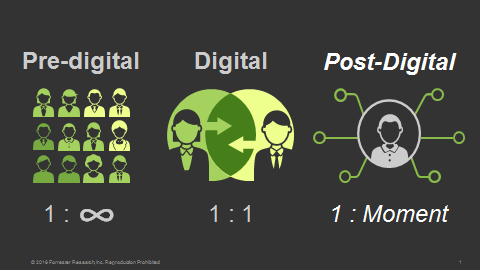Have What It Takes To Win In A Post-Digital World?
We had a fantastic event last week in New York, as 750+ marketing leaders converged on Forrester’s Marketing 2016. The big theme this year was how to succeed as a marketer in a post-digital world.
What’s “post-digital” you ask? Well, we’re living in that world today and it’s time to acknowledge it. Digital technology is embedded in our daily lives as consumers, as professionals – as human beings. I opened the event describing how marketing evolves in three phases: The pre-digital era was characterized by a mass-media centric, one-to-many approach; the digital era ushered in a data-driven, one-to-one mantra; and today we’re in a post-digital world, and your success will be determined by your ability to adapt to one-to-moment marketing.

The digital distinction now dissolves into our daily lives. This raises the stakes for marketers because your customers aren’t just empowered by digital technology – they’re actually entitled. They think they deserve something, they want it now, and if you can’t provide it, they will quickly find it somewhere else. Forrester and industry speakers explored this phenomenon over the course of our 2-day forum. Here are the top 5 key takeaways from last week:
1. Adopt A Post-Digital Mindset.
Forrester’s Shar VanBoskirk unveiled the rules of post-digital marketing: Be human, be helpful, and be handy. Sure, it may take a lot of MarTech and AdTech to win in today’s environment, but our latest research shows that to win in a post-digital world, you need to abandon the advertising mindset, be accountable for your brand promise everywhere (e.g. “do what you say”), and apply the best of what you’ve learned from brand, product, direct, and digital marketing to delight those entitled customers. Suzy Deering, CMO for eBay discussed how she is turning the brand inside out and putting customers in control as eBay continues its journey into the post-digital age.
2. Understand Customer Moments.
Forrester’s Srividya Sridharan explored how marketers should develop a rich customer understanding by working across the organization to build systems of insight. These closed loop systems of people, processes, and technology enable a business to act upon that insight – whenever and wherever customers need you. On this front, we heard from Lilian Tomovich, chief experience and marketing officer of MGM Resorts, on how MGM transformed the customer experience to deliver exactly what its guests want in their moments of need.
3. Win Customers’ Trust.
Forrester’s Fatemeh Khatibloo gave a powerful speech about the mechanics of customer trust. How important is building trust with your customers in a post-digital world? I’ll quote Fatemeh to answer that: “Trust is earned in drops, lost in buckets.” When less than a quarter of consumers tell us they trust ads, it’s clear that trust is a big differentiator for brands in the age of the customer. A great group of panelists joined Fatemeh on stage, including Anne Murray, senior director of marketing at Southwest Airlines, who discussed the need for transparency in building trust with customers.
4. Engage With Customers In Context.
At this same event in 2014, I gave a speech entitled “The Power Of Customer Context.” This was a call-to-action for marketing technologists everywhere to stop what they were doing and take a different approach to all that MarTech and AdTech. This year, my colleague Rusty Warner and I updated that research with some fresh examples of how brands are successfully embracing contextual marketing. Whereas Sri (see above) discussed how businesses need to build systems of insight, Rusty discussed how all of that insight enables marketers to engage with customers through systems of engagement. It is in the marriage of these two “systems” where the magic occurs: delivering one-to-moment, value-driven interactions through a contextual marketing engine.
5. Lead The Change.
Marketers must lead the way on their firm’s journey toward customer obsession in a post-digital world. So, to close out the event, we asked Forrester’s James McQuivey to discuss how marketers can do just that. He began by discussing a key characteristic of the post-digital world – hyper-adoption and hyper-abandonment. Marketers are best positioned to understand that new customer behavior. But more importantly, they must learn to lead the change inside of their respective businesses that will be required to win in this brave new world. Anna Fieler, CMO of POPSUGAR joined this section of the program to discuss how Gen-Z consumers represent a fundamentally different customer base, not to mention a 30% shorter attention span than older generations. This certainly instilled a sense of urgency for us all.
For those who attended, I’m grateful that you chose to spend your valuable time with us. And to those who missed it – I understand, we can’t make all of them; but I hope to see you next year. No matter which camp you fall into, if you’re a Forrester client, please be sure to check out these new Forrester Research reports released at the Forum:
- Leadership In The Age Of The Customer by James McQuivey
- The Mechanics Of Trust by Fatemeh Khatibloo
- Thriving In A Post-Digital World by Shar VanBoskirk, Jim Nail, and Melissa Parrish
Mark your calendar for our 2017 Marketing Forum in New York — April 6-7 at the New York Marriott Marquis. Add Forum to your calendar, and I look forward to seeing you again!
Best,
Carl